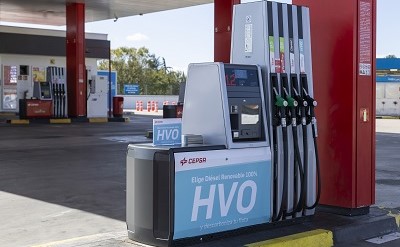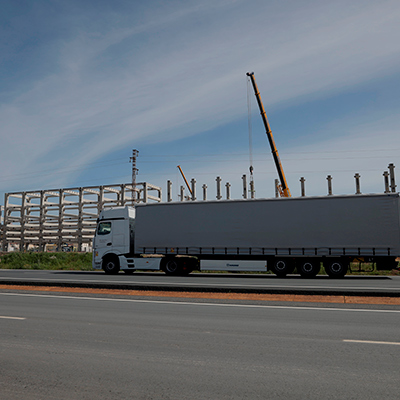An immediate solution to promote the decarbonization of road transport
The energy company has already started selling this second-generation biofuel to its professional customers (carriers, fleets, etc.) at a service station in Madrid (located on the A-3 highway, near the Vallecas neighborhood) and it will be available at three other strategic locations before the end of the year. By 2024, the company's goal is to supply renewable diesel at 20 stations in its network, located in the country's main corridors and logistics hubs.
Cedric Vigneau, Cepsa's Director of Fleets & CRT, expressed his satisfaction on achieving this new milestone and emphasized: "At Cepsa, we remain committed to sustainable mobility, and we want to move towards the future by achieving a tangible impact in the present. That is why we are going to supply HVO in strategic locations for our professional customers, as part of our aim to help them advance in the decarbonization of their operations by offering them this high-quality biofuel."
José Emiliano Pardo, Cepsa's Director of Direct Sales, also emphasized: "We are supplying HVO directly to road freight and services companies to support our customers in their decarbonization process. This is how we continue to promote sustainable mobility as one of the main pillars of our Positive Motion strategy."
The company has already received interest in this renewable fuel from several customers, including large logistics companies and companies from different sectors. Throughout its life cycle (from production to use), HVO achieves a 90% CO2 emission reduction compared to traditional fuels. Moreover, the chemical composition of this biofuel is analogous to the traditional fossil fuels used in today's diesel engines. So no modifications must be made to them or to the storage and distribution infrastructure.
Cepsa produces this second-generation biofuel at its La Rábida Energy Park in Huelva from organic waste such as used cooking oils and agricultural waste, thereby promoting the circular economy. Furthermore, in order to guarantee supply to its land, sea, and air transport customers, Cepsa is going to develop, together with Bio-Oils, the largest second-generation biofuel plant in southern Europe, with an investment of up to 1 billion euros. This facility, which will be opened in 2026 in Palos de la Frontera, Huelva, will have a flexible production capacity of 500,000 tons of renewable diesel and SAF.
After successfully carrying out various tests using renewable biofuels in air, sea, and rail transport, this project represents a new step forward for Cepsa in its objective of facilitating the decarbonization of heavy transport by producing green molecules. As established in its Positive Motion strategy, the company aims to become a reference in the energy transition and lead the manufacture of renewable fuels in Spain and Portugal by 2030 with an annual production capacity of 2.5 million tons and the production of green hydrogen with an electrolysis capacity of 2 GW. It is also developing an extensive network of ultra-fast chargers at its service stations in both countries.
- This biofuel is now available at a service station in Madrid, and the company has also started to supply it directly at the facilities of several customers
- Cepsa is working to supply this biofuel in another three stations in strategic locations before the end of the year. By 2024, it will offer it in 20 stations in its network
- HVO (100% renewable diesel) products are geared towards professional customers, who have already shown interest in this solution, which enables a reduction in CO2 emissions of up to 90%
- Cepsa produces renewable fuels at its La Rábida Energy Park (Huelva) from organic waste and used cooking oils, which the company already supplies to several customers in the aviation, maritime, and railway sectors
The energy company has already started selling this second-generation biofuel to its professional customers (carriers, fleets, etc.) at a service station in Madrid (located on the A-3 highway, near the Vallecas neighborhood) and it will be available at three other strategic locations before the end of the year. By 2024, the company's goal is to supply renewable diesel at 20 stations in its network, located in the country's main corridors and logistics hubs.
Cedric Vigneau, Cepsa's Director of Fleets & CRT, expressed his satisfaction on achieving this new milestone and emphasized: "At Cepsa, we remain committed to sustainable mobility, and we want to move towards the future by achieving a tangible impact in the present. That is why we are going to supply HVO in strategic locations for our professional customers, as part of our aim to help them advance in the decarbonization of their operations by offering them this high-quality biofuel."
José Emiliano Pardo, Cepsa's Director of Direct Sales, also emphasized: "We are supplying HVO directly to road freight and services companies to support our customers in their decarbonization process. This is how we continue to promote sustainable mobility as one of the main pillars of our Positive Motion strategy."
The company has already received interest in this renewable fuel from several customers, including large logistics companies and companies from different sectors. Throughout its life cycle (from production to use), HVO achieves a 90% CO2 emission reduction compared to traditional fuels. Moreover, the chemical composition of this biofuel is analogous to the traditional fossil fuels used in today's diesel engines. So no modifications must be made to them or to the storage and distribution infrastructure.
Cepsa produces this second-generation biofuel at its La Rábida Energy Park in Huelva from organic waste such as used cooking oils and agricultural waste, thereby promoting the circular economy. Furthermore, in order to guarantee supply to its land, sea, and air transport customers, Cepsa is going to develop, together with Bio-Oils, the largest second-generation biofuel plant in southern Europe, with an investment of up to 1 billion euros. This facility, which will be opened in 2026 in Palos de la Frontera, Huelva, will have a flexible production capacity of 500,000 tons of renewable diesel and SAF.
After successfully carrying out various tests using renewable biofuels in air, sea, and rail transport, this project represents a new step forward for Cepsa in its objective of facilitating the decarbonization of heavy transport by producing green molecules. As established in its Positive Motion strategy, the company aims to become a reference in the energy transition and lead the manufacture of renewable fuels in Spain and Portugal by 2030 with an annual production capacity of 2.5 million tons and the production of green hydrogen with an electrolysis capacity of 2 GW. It is also developing an extensive network of ultra-fast chargers at its service stations in both countries.




